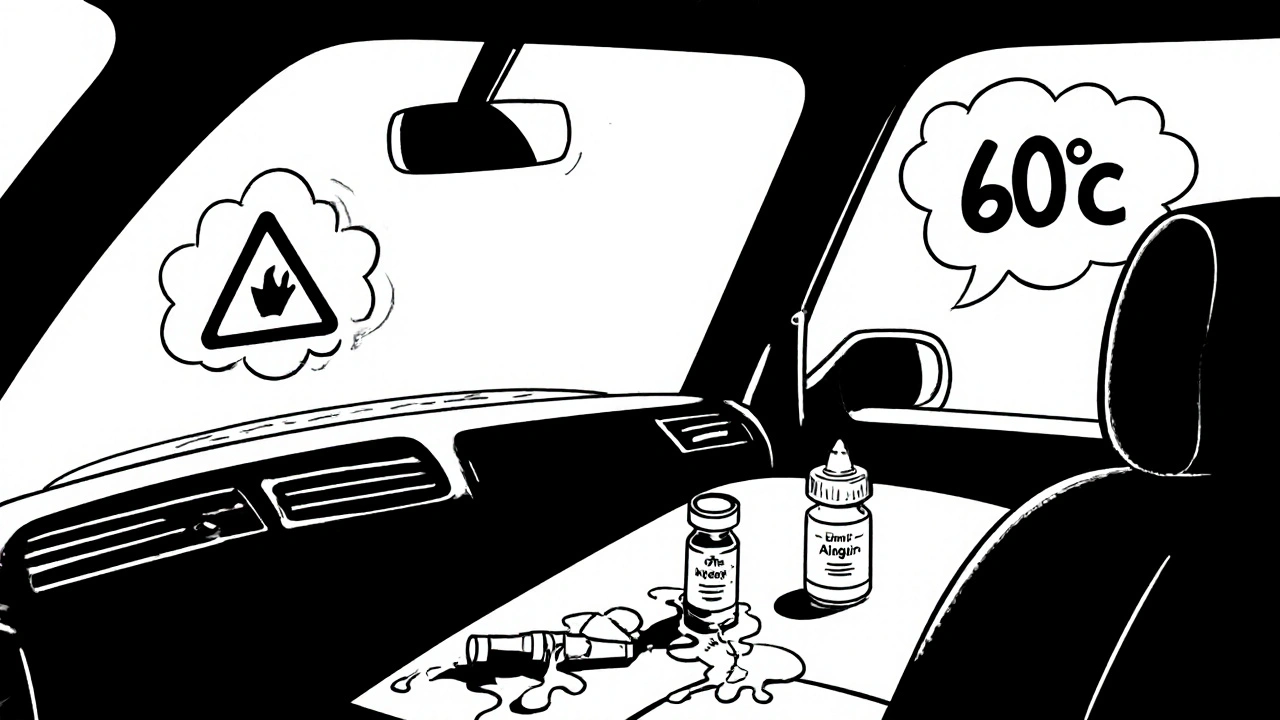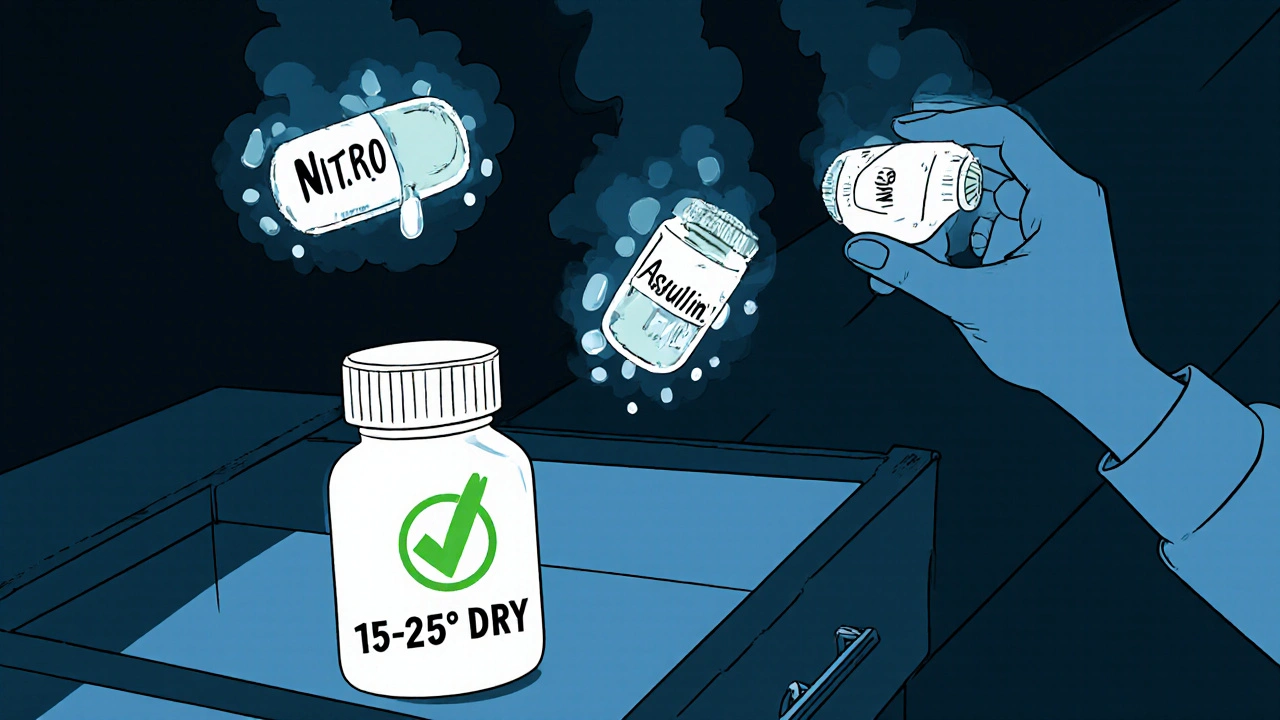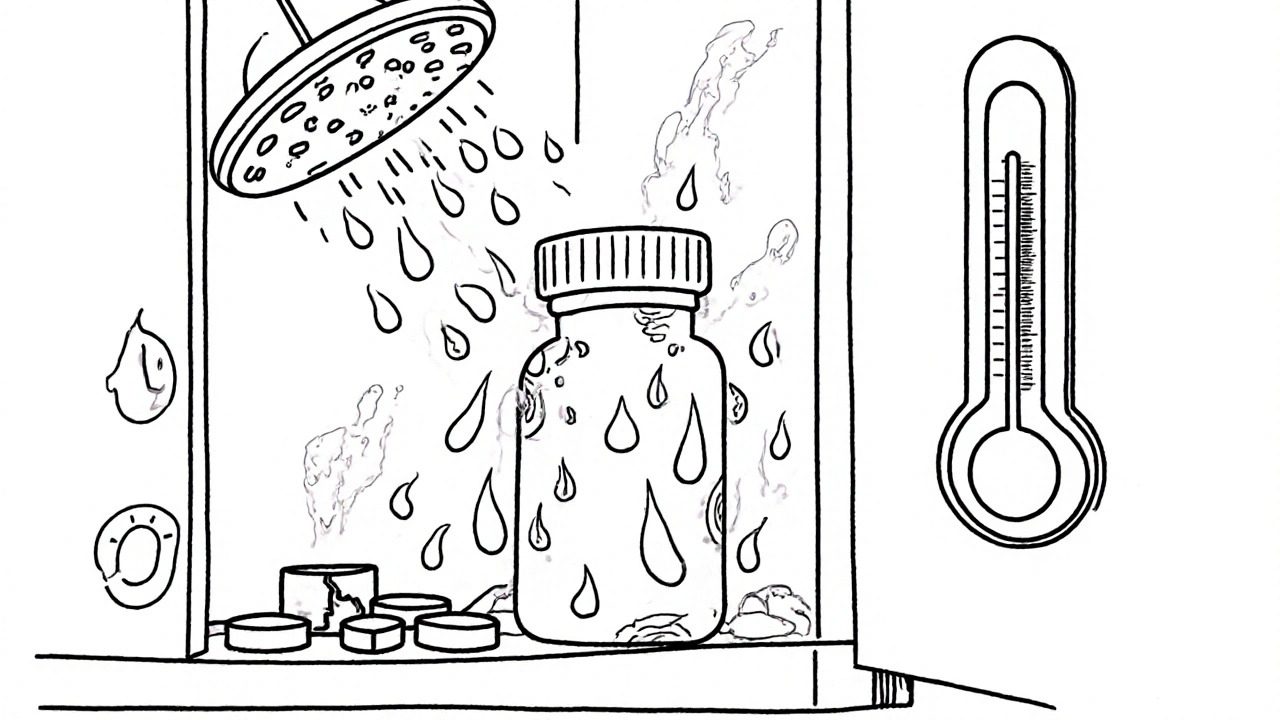Why Your Medicine Might Go Bad Before the Expiration Date
You check the bottle. The expiration date is still months away. So you take it. But what if that pill, capsule, or liquid isn’t as strong as it should be? The truth is, medication expiration isn’t just about time-it’s about where you store it. Heat and humidity don’t just make you uncomfortable; they actively break down your medicine, sometimes long before the printed date on the label.
What Expiration Dates Really Mean
Expiration dates aren’t arbitrary. They’re based on strict testing done by manufacturers under controlled conditions: 20-25°C (68-77°F) and 35-65% humidity. That’s the environment labs use to prove a drug stays safe and effective. But your bathroom? Your car? Your kitchen counter? Those places are nothing like a lab. Once you take medicine out of that controlled setting, the clock starts ticking faster.
The FDA says expiration dates are the last day the manufacturer guarantees full potency and safety-if stored properly. That’s key: if stored properly. If your medicine has been sitting in 35°C heat or a steamy bathroom, it might be half-dead by the time you open it-even if the date says 2026.
How Heat and Humidity Break Down Medicine
Heat and moisture don’t just make pills look weird-they change their chemistry. Tablets can absorb water, causing them to soften, stick together, or crack. Capsules with coatings designed to release medicine slowly can break down too early, dumping the whole dose at once. Liquids can grow mold. Insulin can clump. EpiPens can fail.
Take aspirin. When it gets wet, it breaks down into salicylic acid and vinegar. That’s why old aspirin sometimes smells like vinegar. It’s not just weaker-it can irritate your stomach more. Nitroglycerin, used for chest pain, degrades rapidly above 25°C. If you’re carrying it in your pocket on a hot day, it might not work when you need it most.
Biologics like monoclonal antibodies? They’re proteins. Heat above 8°C makes them unfold and die-permanently. One hour in a hot car can ruin them. Same with insulin: at 37°C, it loses up to 20% of its strength in just 24 hours. For someone with diabetes, that’s not a small drop. It’s a risk of high blood sugar, hospital visits, even long-term damage.
Which Medications Are Most at Risk?
Not all drugs are created equal. Some handle heat like a rock. Others fall apart at the first sign of warmth.
- Highly sensitive: Insulin, nitroglycerin, thyroid meds (like levothyroxine), liquid antibiotics (like amoxicillin suspension), biologics, EpiPens, inhalers
- More stable: Solid pills like ibuprofen, acetaminophen, statins, most antidepressants
Even stable drugs aren’t invincible. A 2020 NIH study found that while most tablets kept 85-90% potency at 40°C for 30 days, that’s still a 10-15% drop. For someone relying on a precise dose-say, a blood thinner or seizure medication-that’s dangerous.
EpiPens are especially scary. When exposed to temperatures above 30°C for too long, their internal mechanisms can jam. In anaphylaxis, you don’t get a second chance. A failed EpiPen isn’t just ineffective-it’s potentially fatal.

Where Not to Store Your Medicine
The worst places? The obvious ones-and the ones people think are fine.
- Bathroom cabinet: Humidity hits 70-90% after every shower. That’s worse than a rainforest. Moisture seeps into bottles, even if they’re closed.
- Kitchen counter near the stove or sink: Temperatures regularly climb above 32°C (90°F). Humidity from boiling water or dishwashing pushes past 60%.
- Car glovebox or dashboard: On a sunny day, a car can hit 60°C (140°F). That’s hotter than an oven. Inhalers can explode. Pills melt. Liquids boil.
- Windowsill or near a radiator: Direct sunlight and heat speed up chemical breakdown. Even dark bottles aren’t enough.
One study found that 91% of healthcare workers knew medicine should be stored in a cool, dry place. But only 47% of patients actually did it. Most people don’t realize their bathroom is a drug-degrading zone.
How to Store Medicine the Right Way
Here’s what works:
- Keep it in its original container. The bottle isn’t just for labeling-it blocks light and moisture.
- Use a cool, dry spot: a bedroom drawer, a shelf in your closet, or a cabinet away from heat sources.
- Temperature should stay between 15-25°C (59-77°F). Humidity below 60%.
- Never transfer pills to pill organizers unless you’re using them immediately. Those containers don’t protect against moisture.
- If you’re traveling, carry sensitive meds (insulin, EpiPen, nitroglycerin) in a cooler with a cold pack. Pharmacies sell insulated pouches for this.
- For long trips, ask your pharmacist: “How long can this stay out of the fridge?” Some meds are fine at room temp for weeks. Others aren’t.
And here’s a simple trick: if you wouldn’t leave your phone in that spot, don’t leave your medicine there either. Phones don’t like heat. Neither do pills.
Signs Your Medicine Has Been Damaged
You can’t always tell by looking. But here are red flags:
- Color changes: pills turning yellow, brown, or faded
- Unusual smell: vinegar (aspirin), chemical, or musty odor
- Texture changes: tablets that crumble, stick together, or feel oily
- Cracked or swollen capsules
- Liquid that’s cloudy, has particles, or smells off
If you see any of these, don’t take it. Even if the date is still good. The damage is already done.

Why It Matters: Real Risks, Not Just Theory
Using degraded medicine isn’t just ineffective-it’s dangerous.
Take antibiotics. If they’ve lost potency, they won’t kill all the bacteria. The survivors become resistant. That’s how superbugs form. One study linked poor storage to increased antibiotic resistance in communities with high heat exposure.
For diabetics, degraded insulin means high blood sugar. That leads to nerve damage, kidney failure, vision loss. For heart patients, weak nitroglycerin can mean a heart attack isn’t stopped in time. For people with severe allergies, a failed EpiPen is a death sentence.
The FDA says: “Using expired medicines is risky and possibly harmful.” But the real risk isn’t just expiration-it’s improper storage. And that’s something you can control.
What’s Changing in the Industry
Pharmacies are starting to catch on. More meds now come with desiccants (tiny moisture-absorbing packets) inside the bottle. Some have opaque, airtight packaging. A few companies are testing smart labels that change color if the drug got too hot.
But the biggest gap isn’t in packaging-it’s in education. Most people still think “expiration date = safe until then.” They don’t realize their medicine might be dying in the bathroom while they sleep.
As climate change brings longer, hotter summers, this problem will only grow. The World Health Organization now calls medication stability in extreme heat a public health threat. In places where temperatures regularly hit 35°C (95°F), storing medicine properly isn’t a luxury-it’s a survival skill.
What You Should Do Today
Don’t wait for a bad outcome. Do this now:
- Check where your meds are stored. Move them out of the bathroom, kitchen, or car.
- Look at your insulin, EpiPen, thyroid pills, and antibiotics. Are they in a cool, dry spot?
- Check for visual signs of damage. If anything looks off, toss it and get a new one.
- Ask your pharmacist: “What’s the best way to store this?” They’ll tell you.
- When traveling, pack meds in your carry-on-not checked luggage. Temperatures in cargo holds can drop below freezing or soar above 40°C.
Your medicine works best when it’s stored right. Don’t let heat and humidity steal its power.
Can I still use medicine after its expiration date if it looks fine?
No. Even if it looks normal, heat and humidity can break down the active ingredients without changing the appearance. A pill might look perfect but have lost 30% of its strength. For life-saving drugs like insulin, EpiPens, or heart meds, that’s too risky. Always follow the expiration date-and store properly to make sure it’s still valid.
Is it safe to store pills in a pill organizer for weeks?
Only if you’re using them within a few days. Most pill organizers don’t protect against moisture or light. If you leave them on a windowsill or in a humid bathroom, the pills can degrade faster than in the original bottle. Use organizers only for short-term use, and keep the original bottles in a cool, dry place.
What should I do if I left my insulin in a hot car?
Throw it away. Insulin can lose potency in just a few hours above 30°C. Even if it looks clear, it may no longer work. Don’t risk high blood sugar or diabetic complications. Always carry a spare in a cooler when traveling, and never leave insulin in a parked car-even for a few minutes.
Do refrigerated medications need to stay cold all the time?
It depends. Some, like insulin, can be kept at room temperature (below 25°C) for a few weeks after opening. Others, like certain biologics, must stay refrigerated until used. Always check the label or ask your pharmacist. If you’re unsure, keep it cold. Better safe than ineffective.
Can I tell if a medicine has been damaged just by looking at it?
Sometimes, but not always. Look for color changes, unusual smells (like vinegar), pills that stick together, or capsules that are cracked. But many drugs degrade without any visible signs. If you suspect your medicine was exposed to extreme heat or moisture, don’t take it-even if it looks fine.

12 Comments
Girish Pai
November 18 2025
Let’s cut through the fluff-this isn’t about storage, it’s about systemic neglect. In India, we’ve been dealing with 45°C summers for decades and still rely on pharma supply chains that treat meds like they’re in a fridge. The FDA guidelines? Luxuries for the global north. We don’t have climate-controlled cabinets-we have ceiling fans and hope. The real failure isn’t the patient storing insulin in a drawer-it’s a global system that doesn’t design for heat. Biologics need cold chains, not platitudes. Fix the infrastructure, not the behavior.
Hal Nicholas
November 20 2025
Oh wow. Another ‘you’re killing yourself by storing pills in the bathroom’ lecture. Newsflash: most people don’t live in climate-controlled utopias. I’ve got three kids, a leaky roof, and no closet that isn’t stuffed with laundry. You think I care about 15% potency loss when I’m choosing between medicine and groceries? This post reads like a rich person’s guilt trip disguised as public health advice. You’re not helping. You’re just making people feel dumb.
Christine Eslinger
November 20 2025
I love how this post breaks it down so clearly-but I want to add something practical. If you’re worried about your meds, get a small digital thermometer and hygrometer (under $15 on Amazon). Keep it next to your medicine cabinet. If it’s over 75°F or 60% humidity, it’s time to move things. I used to keep my thyroid med in the bathroom-now it’s in a drawer with my socks. No more anxiety. Also, if you’re traveling, buy one of those insulated pill cases with ice packs-they’re lifesavers. And yes, if your insulin smells weird or looks cloudy? Toss it. No second chances. Your body deserves better than guesswork.
Heidi R
November 20 2025
You’re all just so… naive. This isn’t about humidity. It’s about Big Pharma hiding the truth. They print expiration dates to force repeat sales. Insulin? They know it lasts years. They just don’t want you to know. And don’t get me started on the ‘desiccant packets’-those are placebo props. The real degradation happens in the lab during testing. They manipulate the data. You’re being played. Your EpiPen? Probably fine. But you’ll never know because you’ve been conditioned to fear.
Brenda Kuter
November 21 2025
MY DAD DIED BECAUSE HIS NITROGLYCERIN FAILED IN HIS POCKET DURING A HEATWAVE. I’M NOT KIDDING. I WAS 14. HE WAS HOLDING IT IN HIS HAND AND IT DIDN’T WORK. THE DOCTOR SAID ‘IT MIGHT HAVE BEEN EXPOSED.’ I’M STILL ANGRY. NOW I CARRY TWO IN MY BRA, I’M SERIOUS. IF YOU’RE NOT DOING THE SAME, YOU’RE PLAYING RUSSIAN ROULETTE WITH YOUR LIFE. I HOPE YOU NEVER HAVE TO LEARN THIS THE HARD WAY.
Shaun Barratt
November 22 2025
While the general sentiment of this article is commendable, one must acknowledge the epistemological limitations inherent in generalizing storage protocols across diverse climatic zones. The assumption that a bedroom drawer constitutes optimal storage presumes ambient temperature stability, which is not universally verifiable. Furthermore, the implicit privileging of Western pharmaceutical standards neglects the pragmatic adaptations employed in low-resource environments. A more nuanced approach would incorporate ethnographic data on actual user behavior, rather than prescribing idealized conditions.
Iska Ede
November 23 2025
So let me get this straight-you’re telling me my 10-year-old aspirin that smells like vinegar is *dangerous*? 🤦♀️ I’ve been taking that since college. It’s basically a natural home remedy now. Next you’ll say my kombucha is a biohazard. Chill. The real danger is paying $80 for a new bottle when the old one still kinda works. I’m not dying, I’m just… creatively compliant.
Gabriella Jayne Bosticco
November 25 2025
This is one of those posts that feels like a hug from someone who actually gets it. I’m a nurse, and I’ve seen too many patients take degraded meds because they ‘look fine.’ I always tell them: ‘If your phone overheats and shuts off, you don’t keep using it. Why would you do that with your life?’ I keep my insulin in a little insulated pouch in my purse-got it from my pharmacy. And I never, ever leave meds in the car. Ever. Even for 10 minutes. It’s not about being perfect. It’s about being intentional.
Sarah Frey
November 26 2025
Thank you for the thorough and compassionate breakdown. I appreciate the emphasis on actionable steps rather than fear-mongering. The comparison to phone storage is particularly effective-it’s relatable and cuts through the technical jargon. I would only add that for those without access to climate-controlled spaces, community centers, libraries, or pharmacies may offer refrigerated drop-off points for sensitive medications. This is a public health issue that requires infrastructure, not just individual responsibility.
Katelyn Sykes
November 28 2025
Just moved my insulin from the bathroom to the bedroom drawer and I feel like a genius 🙌 I didn’t even realize my amoxicillin had gotten sticky until I opened it last week. Now I keep a little note on my fridge: ‘Medicine Zone - No Heat, No Humidity, No Drama.’ My dog even knows not to knock over the drawer anymore. Small changes. Big difference. And yes I still use the pill organizer for my morning pills but only for the week and I keep it in the same drawer. No windowsills. No car. No excuses.
Gabe Solack
November 29 2025
Biggest takeaway: if you wouldn’t leave your phone there, don’t leave your meds there. 😅 I used to keep my EpiPen in my gym bag-until I left it in my car after a workout and it got 110°F. Now I have a tiny cooler in my trunk with a cold pack. It’s not glamorous, but it’s cheaper than an ambulance ride. Also, pharmacies give out free insulated pouches if you ask. Seriously. Just say ‘I need a travel case for my insulin.’ They’ll hand it to you. No shame. Just safety.
Yash Nair
November 29 2025
India knows how to handle heat. We’ve been storing medicines in cloth bags near ceiling fans for generations. Why are Americans acting like this is new? You think your fancy fridge-stored pills are better? My uncle took his blood pressure med in 48°C heat for 10 years and he’s still alive. You people are too soft. Stop crying about humidity. Learn to adapt. This post is colonial nonsense dressed up as science.